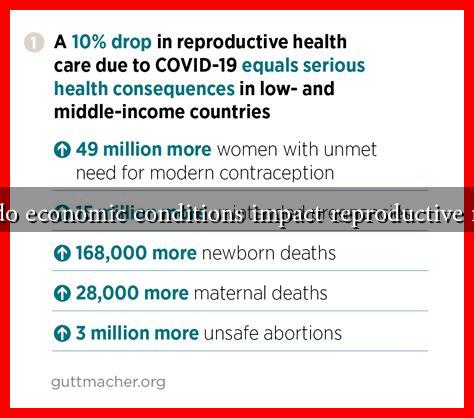-
Table of Contents
How Do Economic Conditions Impact Reproductive Rights?
Reproductive rights encompass a range of issues, including access to contraception, abortion services, and comprehensive sex education. These rights are not only a matter of personal choice but are also significantly influenced by economic conditions. This article explores how economic factors shape reproductive rights, examining the interplay between financial resources, government policies, and societal attitudes.
The Link Between Economic Stability and Reproductive Rights
Economic conditions can directly affect the availability and accessibility of reproductive health services. When economies are stable and growing, governments are more likely to invest in public health initiatives, including reproductive health. Conversely, during economic downturns, funding for these services often faces cuts, leading to reduced access for individuals in need.
- Increased Funding: In prosperous times, governments may allocate more resources to healthcare, including reproductive services.
- Policy Changes: Economic growth can lead to progressive policies that enhance reproductive rights, such as expanded access to contraception and abortion services.
- Public Awareness: Economic stability often correlates with increased public awareness and advocacy for reproductive rights.
Case Studies: Economic Downturns and Reproductive Rights
Several case studies illustrate how economic downturns can adversely affect reproductive rights. For instance, during the 2008 financial crisis, many states in the U.S. faced budget shortfalls, leading to cuts in funding for family planning services. According to the Guttmacher Institute, these cuts resulted in a significant decrease in the number of women receiving contraceptive services, which in turn led to an increase in unintended pregnancies.
Another example can be seen in countries like Greece, where the economic crisis of the late 2000s led to austerity measures that severely impacted healthcare services. Access to reproductive health services diminished, and many women reported difficulties in obtaining contraception and safe abortion services. A study published in the journal Reproductive Health highlighted that economic hardship directly correlated with increased rates of maternal mortality and morbidity during this period.
Socioeconomic Disparities and Access to Reproductive Rights
Economic conditions also exacerbate existing socioeconomic disparities, which can further limit access to reproductive rights. Low-income individuals often face multiple barriers, including:
- Cost of Services: High costs associated with reproductive health services can deter low-income individuals from seeking care.
- Transportation Issues: Economic hardship can limit access to healthcare facilities, particularly in rural areas.
- Lack of Insurance: Many low-income individuals lack health insurance, making it difficult to afford necessary reproductive health services.
For example, a report from the Kaiser Family Foundation indicated that during the COVID-19 pandemic, women of color and those from low-income backgrounds faced significant barriers to accessing reproductive health services, highlighting the intersection of economic conditions and reproductive rights.
The Role of Government Policies
Government policies play a crucial role in shaping reproductive rights, particularly during times of economic uncertainty. Policies that prioritize reproductive health funding can mitigate the negative impacts of economic downturns. For instance:
- Comprehensive Health Coverage: Expanding Medicaid and other health programs can improve access to reproductive health services for low-income individuals.
- Support for Family Planning: Investing in family planning programs can reduce unintended pregnancies and improve maternal health outcomes.
- Education and Awareness: Funding for sex education programs can empower individuals to make informed choices about their reproductive health.
Conclusion
The relationship between economic conditions and reproductive rights is complex and multifaceted. Economic stability can enhance access to reproductive health services, while economic downturns often lead to cuts in funding and increased barriers for vulnerable populations. As demonstrated through various case studies, the impact of economic conditions on reproductive rights is profound, affecting not only individual choices but also public health outcomes. To ensure equitable access to reproductive rights, it is essential for policymakers to prioritize funding and support for reproductive health services, particularly during challenging economic times.
In summary, understanding the economic factors that influence reproductive rights is crucial for advocates, policymakers, and individuals alike. By addressing these issues, we can work towards a future where reproductive rights are accessible to all, regardless of economic status.

